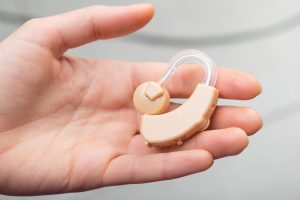 Hearing loss affects millions of people living in the U.S. It is a common health problem that occurs in older adults. In fact, almost half of adults ages 65 and older suffer from some degree of hearing loss. Unfortunately for some individuals, there are barriers to obtaining affordable and effective hearing aids.
Hearing loss affects millions of people living in the U.S. It is a common health problem that occurs in older adults. In fact, almost half of adults ages 65 and older suffer from some degree of hearing loss. Unfortunately for some individuals, there are barriers to obtaining affordable and effective hearing aids.
In an effort to improve access to safe, effective, and affordable hearing aids, the United States Food and Drug Administration (FDA) recently issued a ruling to allow over-the-counter (OTC) purchases of the devices. According to the FDA, “This action enables consumers 18 years of age and older with perceived mild to moderate hearing loss to purchase hearing aids directly from stores or online retailers without the need for a medical exam, prescription, or a fitting adjustment by an audiologist.”
The FDA also stated that consumers may be able to purchase hearing aids at traditional drugstores and pharmacies as well as online retail stores as soon as mid-October. Consumers are being encouraged to learn more about over-the-counter hearing aids before making a purchase. Here are some important facts potential buyers should know:
- OTC hearing aids are only intended for adults with perceived mild to moderate hearing loss.
- OTC hearing aids may not help you if you have trouble hearing loud sounds such as power tools or have trouble hearing conversations in quiet places.
- OTC hearing aids are not intended for use by children with hearing loss.
- OTC hearing aids should not be confused with personal sound amplification products (PSAPs). Hearing aids are medical devices designed to help a person with or compensate for impaired hearing, while PSAPs are electronics that are used by non-hearing impaired persons to amplify sounds in certain environments.
- Although most OTC hearing aids will be designed to fit most, choosing the best device for you may take some trial and error.
If you are experiencing hearing loss, it is recommended that you see a doctor. Your physician can rule out any serious causes including earwax buildup or certain medical conditions. A doctor can also help you to determine if you are a good candidate for OTC hearing aids.
You should also see a doctor if you are experiencing the following symptoms: dizziness, ringing, roaring or beeping in the ear, the drainage of fluid or pus from the ear, or persistent pain or discomfort in the ear.
All content of this newsletter is intended for general information purposes only and is not intended or implied to be a substitute for professional medical advice, diagnosis or treatment. Please consult a medical professional before adopting any of the suggestions on this page. You must never disregard professional medical advice or delay seeking medical treatment based upon any content of this newsletter. PROMPTLY CONSULT YOUR PHYSICIAN OR CALL 911 IF YOU BELIEVE YOU HAVE A MEDICAL EMERGENCY.
